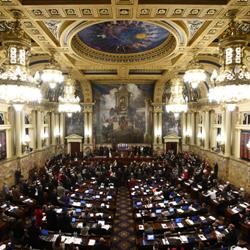Pennsylvania Legislature Finally Passes iGambling Bill

Four years after three US states adopted online gambling regulation in 2013, Pennsylvania is now poised to join Nevada, Delaware and New Jersey in allowing online gambling within its borders. Following several years of trying, the exciting development became a reality in the Keystone State this week after the Senate passed iGaming bill H 271 on Wednesday, with the House also voting through the bill on Thursday.
Gov. Tom Wolf now has ten days to add his final seal of approval to the bill before the piece of legislation automatically passes into law, and commenting upon this final stage, gaming analyst Steve Ruddock, tweeted:
“There’s no reason for the Governor not to sign this bill. Gaming has always been part of the process, and it ends the budget stalemate.”
Background
Pennsylvania has been flirting with the idea of passing online gambling legislation for several years now, with the state’s huge $2 billion budget shortfall having added a recent urgency to the debate. According to estimates, Pennsylvania stands to generate an additional $200 million in revenue from a fully regulated online gambling market, but nonetheless, lawmakers have proved unable to negotiate a budget package that would satisfy the requirements of its lawmakers.
It then looked like the budget crisis might have been allowed to drag on until next year, which would have also delayed any online gaming expansion, but that all changed this week. Following four months of negotiation breakdowns, the state legislature subsequently passed most of the state’s funding package, with a gambling expansion green light now all but finalizing the process.
Gambling Expansion
In addition to legalizing gambling online, the bill allows for video gaming terminals to be placed at truck stops, and airports in Pennsylvania, as well as the building of 10 new mini-casinos. Furthermore, lottery sales and daily fantasy sports (DFS) will be able to take place online, while sports betting regulations will also be introduced should the Professional and Amateur Sports Protection Act (PASPA) be overturned, the federal law current restricting the industry to just the states of Nevada, Oregon, Delaware, and Montana.
In 2012, Pennsylvania became the second biggest gambling state in the US, with the $3.16 billion in casino revenues it generated having knocked New Jersey off a spot it had held for decades. However, over the past few years revenues have remained fairly flat, and last year came in at $3.21 billion, with slot machines accounting for $2.36 billion of that amount, and table games the remaining $853 million.
The latest gambling expansion push should help Pennsylvania’s gambling market to return to significant growth once more, and as House Republican Leader Dave Reed explained after the bill was passed:
“I’ve traditionally been against expanded gaming, but the reality of the situation is, when you’re looking at billions of dollars of tax increases, or expanding something that’s already going on in Pennsylvania, I think that’s key.”
Bill Details
The bill will permit a range of different gambling activities to take place online, including poker, slots, casino games, DFS, and lottery sales. Furthermore, tablet gaming will also be allowed in designated areas inside airports. In the meantime, video gaming terminals have been approved for truck stops, while ten “satellite” casinos will be allowed to be built in-state.
In addition, the 12 casinos currently operating in Pennsylvania will be able to apply for licenses to offer the whole range of online gambling products at a cost of $10 million, including poker, slots and table games. The tax rates applied to these products will be 54% for slots, 16% for poker, and 16% for table games.
Landmark Development
News of Pennsylvania’s imminent forage into the world of online gambling comes shortly after New Jersey, Nevada and Delaware agreed to share their online poker playing pools. This will subsequently set up a more efficient, well-sized and already established online poker market in which state residents can play, while Pennsylvania’s population of almost 13 million people will also provide a further huge boost to the iPoker compact.
Needless to say, Pennsylvania’s decision has been hailed as a major coup for the online poker community, and commenting upon the piece of legislation’s passage, John Pappas, Executive Director of the Poker Players Alliance (PPA), stated:
“Pennsylvania made the right decision today. This is a major victory for consumers who, for years, have asked the state to step up and provide meaningful protections. The iGaming law will also help create new growth opportunities for the Commonwealth’s brick and mortar casinos while providing needed revenue for the state budget.”









